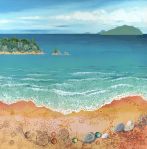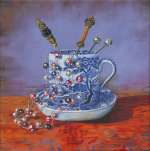
With the battle of procrastination to overcome to get on with your creative work, you’d think taking a break from it would be a easy thing to do – so why isn’t it? Well, for one thing it may depend on why you are taking a break. Is it a much deserved relaxation period you’ve decided to enjoy with your partner, friends or family? Is it a solo decision where you feel your batteries are spent, or you feel the need for a resting phase after completing a big project and you want time out? Or is it because you are laid low with illness and you need recovery time? Maybe it’s a case of family commitments or other kinds of life necessities that suddenly have to come first before the ‘luxury’ of doing your creative work? It might even be, as in my own case, that you have to attend to one art form at the expense another. All these pulls are valid, and will affect your creative project motivation and goals in varying ways with different degrees of discomfort.
But whatever the reason, I think we all probably feel similar withdrawal symptoms while our work lies lingering/mouldering/vegetating, as we see it, while we have to get on with ‘real life’. These symptoms may be:
1. An itch in the mind and soul that needs scratching and the only solution is to get to the laptop or pick up your pencils or brushes, or whatever your crafting tools happen to be. You want to feel them in your grasp again. You yearn to pick up where you left off and make something emerge.
2. You begin to doubt yourself. And the inner dialogue can go something like this:
For writing
You’ll have forgotten where you were, you’ll have to pick up all the threads again. That won’t be easy. And you’ll have forgotten the narrative tone, and where you were with it mentally and emotionally.
All writers say you have to write every day, otherwise you lose it.
Lose what exactly?
The knack, the flow…
Oh
You can’t call yourself a writer if you don’t write. You’re not taking it seriously enough if you can take a break from it like this. Real writers don’t take a break. Serious professional writers don’t take a break. Serious professional writers put their art first. Always!
Writing is an essential part of you – you have to do it for your identity and your meaning in life. You’ll lose your identity and meaning if you don’t write!
For painting
Looking at your empty desk or easel you shudder and think, I’m neglecting my artist self. There should be a painting being worked on right there as a matter of course. The space, uncluttered as it is, looks empty and cold, devoid of any magic whatsoever, and it’s a visual absence that strikes you to your core.
No painting on your desk means you’re not an artist. Get your ideas list out right now and choose something to get going with or you’re going to lose the knack. Your muse will leave in a huff and not come back. Leave it any longer, and you’ll have had it.
You’ll lose your drawing ability, your colour mixing skills, your compositional judgement – all the skills you’ve built up over the years will disappear. These creative ‘muscles’ have to be worked and to be kept toned and honed. You know that, so do something about it, now!
Painting is an essential part of you – you have to do it for your identity and your meaning in life. You’ll lose your identity and meaning if you don’t paint!
You can see that no matter what form your creative work takes, roughly the same inner dialogue goes on when, for whatever reason, you are having to put it aside for a while.
So whatever the reason for taking a break, how can you manage the conflicts and tensions that stem from withdrawal in a constructive way? What can you do to make it a little easier?
Here are some tips I’ve found useful which I hope may help…
FOR WRITING
1. Keep your writing desk tidy, but with any working notes or reference material still in place visually, so it looks like you were just sitting down at your keyboard yesterday.
2. Dust your desk regularly – I know, I know. But it works! Finding dust is so demoralising, because it’s such a tangible and symbolic sign of sheer neglect and apathy. You don’t want your writing space to feel like Great Expectations Mrs Havisham’s cobwebbed and decaying parlour, blanketed in dust, which hasn’t seem any light or life in it for years, do you?
3. Think of the characters within your current work in progress as being on stage, waiting for you. But rather than imagining them tapping their feet with impatience, waiting for you to get on with the writing right now, imagine them having a cuppa. They are chilled. They know their parts. They are consummate actors and they trust their director, which of course is you. And because of all that, they are happy to wait and chat amongst themselves because they know the wait is worthwhile.
4. While in the company of others or doing whatever those things are that have taken you away from your creative writing, know that there will be writer’s material popping up for your keenly observing writer’s mind all around you in the unlikeliest places. Human nature and settings are all around us. You don’t have to be typing to be a writer. You can be watching, or even listening in ;>)
5. Attend to your reading. That’s a fine way of keeping in touch with your writing, because of all those personal responses you have to what you feel, think, and visualise while you are reading.
FOR PAINTING
1. Have a painting there waiting for you on your easel or desk. Fill that yawning space. Even if it’s just the beginning of a drawing or an initial wash. Have the visual reference there too. And maybe tubes of paint out ready. So when you glance at that space, it is filled with intention – just like a writer’s space.
2. Remind yourself that you have lots of experience painting, and you know it far more than you could ever consciously realise. The skills or inspirations don’t just disappear with lack of use, no matter what some types of ‘in the know’ artists may tell you. You know through repetition, through having journeyed through so many subjects, through having delighted in the processes and visuals, but you know also through that sense of time being held in suspense while you work on a drawing or a painting – and as long as you choose to be an artist, you know that feeling never goes away. Trust your inner artist.
3. Indulge your senses in line, colour and texture in the world around you to keep your visual artist happy and flexing those muscles.
4. Ask yourself questions as to why something visual in particular pleases you? Why does move you? Can you take a few photographs? How would you represent it or incorporate it in a painting? Do these things and you’ll soon tune into your inner artist.
Finally, if all else fails, hold in your mind the image of a sleeping cat. Chilled in the now, yet ready to stir to perform, with assurance, according to its true nature as soon as it wakes. As soon as it gets the chance!

(Both pics from pixabay)
(And on the subject of taking breaks, I’ll be taking a wee one for a couple of weeks – but I’ll be back!)
















Pingback: November Round-up: 8 excellent articles I want to share | Ari Meghlen – Writer | Blogger | Bad card player
As 2013 came to a close, I realized that I was really tired of words, especially MY words! I ended the year by saying goodbye to my first blog and to all other writing activities and speaking engagements. I “went silent” for two years. During that time, I delved into the original Chinese of the Tao Te Ching, not seeking to translate it, but simply to contemplate it. No agenda or timeline. When I felt called, I started my current blog and also began to lead in person contemplation groups twice a month. That period of lying fallow was so important. So when we are feeling like we are in a dry spell, it doesn’t always mean that it is something to fix. You seem to have a deep awareness of the ebbs and flows of your muse, moving from writing to painting, or stepping away from both for a break. Very wise, I think.
LikeLiked by 1 person
Thanks for sharing this Galen. Yes, we have to go with our gut sometimes and decide to let one of our passions rest a while without feeling a sense of neglect. I honestly couldn’t just stick to words, I have to have painting in my life too. I have let my painting rest, but have been doing craft related things instead…but the painting brush is calling me and I’ll be getting to it as soon as I’ve finished the first draft of my novel. I edit heavily as I write so the finished first draft is a biggie for me and the finishing line is in sight. I crocheted my first hat recently, too shy to post a picture though!
LikeLike
Have a great break Lynne. I am taking some time off too, to sort my house out! Also I don’t have an idea for another novel at the moment, so I figured instead of forcing it, I’d be better concentrating on other things and letting it appear when it’s ready.
LikeLiked by 2 people
Absolutely, Catherine! There’s no way I could write/paint if my house needed sorting out – and that can be a pleasure in itself – hope it goes well!
LikeLike
That was enjoyable and it made me visualise my studio and the half started canvas that’s waiting for me to decide which way to go with it. I hope whatever it is you’re doing in the next 2 weeks is enjoyable and positive too. Xx
LikeLiked by 1 person
Cheers, Sylvia!
LikeLike
It must be very difficult pursuing two art forms as you do. Many years ago a medical person advised me not to split myself into different creative parts but to concentrate on one. I took his advice. In my case it’s been to let the art side go, but I compensate by capturing images with my camera instead and posting them on social media. I’m still creating in colour and form. Thanks for your tips.
LikeLiked by 2 people
That’s really interesting, Libby. I’ve heard that said too, about not splitting oneself into two so to speak. I find I devote far more time to my writing because that is more new to me. I have spent years painting, teaching it, so it kind of operates as a fall back for me, with plenty of productivity under my belt. Painting, I find, more relaxing that writing, and it uses a different part of me, as I’m sure you’ll understand. It’s great that you keep your inner artist alive with your camera, using the artists eye to capture the world around you – and that you share it – its a perfect outlet!
LikeLiked by 2 people
thanks Lynne. yes, i find art in its many forms to be more relaxing that writing. writing is tough, but fantastic rewards to be had when we are able to develop an idea into a fleshed-out satisfying piece of work. as you say, we use a different part of ourselves for painting. wonderful to be given this gift of creativity.
LikeLiked by 1 person
Yes it is, Libby. Over time I’ve appreciated and respected it more and more. It makes life interesting and stimulating!
LikeLiked by 1 person
Another valuable post, Lynne! I struggle to take breaks and they only happen when an activity forces me to. I’ve hurt my back through swimming and had to cut back on sporting activities. So it means I can do more writing for NaNoWriMo. But I miss my sports and feel I’m losing fitness. As a creative, this happens too – not having time to blog as I need to up my word count. Taking a break is hard, but so necessary to recharge the batteries. I wish you a wonderful break, you deserve it 🙂
LikeLiked by 1 person
Many thanks, Sumi! At least there is an activity you love to do while your back recovers. Good luck with NaNoWriMo – maybe I will give it a try some time, very daunting to me though, yet would probably be very good for me. I did some front crawl recently (so thought of you), just a couple of lengths, not as long in distance as my local pool, but still was a great feeling – maybe I’m finally getting the hang of it :>)
LikeLiked by 1 person
My house has looked like Mrs. Havisham’s, but not my desk:) It may be messy, but not often dusty. I do sit down and write something every day, even if it’s just a story idea or sentence.
LikeLiked by 1 person
Enjoy your break:)
LikeLiked by 1 person
I will! It can be tough coming up with posts every week!
LikeLiked by 1 person
I have fallen so far off my blog writingschedule. I vow to start a regular practice again and soon.
LikeLiked by 1 person
Well, we’re allowed lapses, wouldnt be human otherwise. I just seem to plan my lapses instead :>)
LikeLiked by 1 person
Lovely, Cheryl! And I agree, my desk gets dusted more than anywhere else too, and I frequently check it before sitting down to paint or write. Must be something symbolic going on!
LikeLiked by 1 person